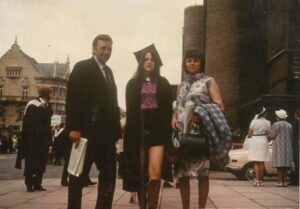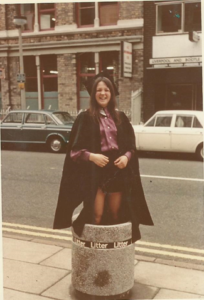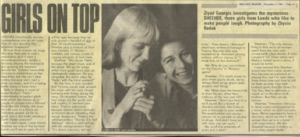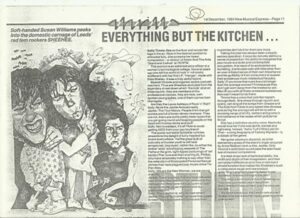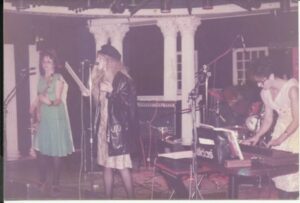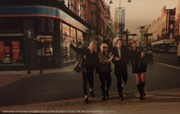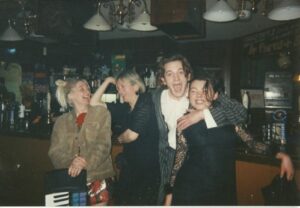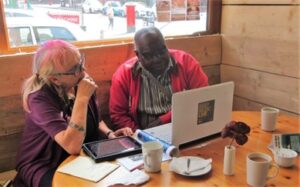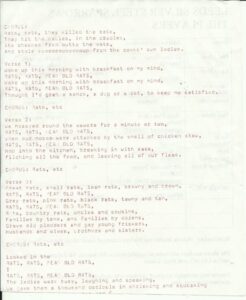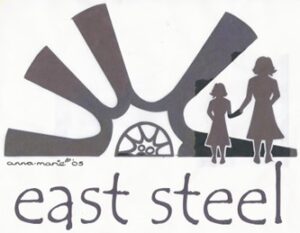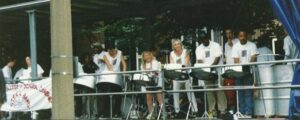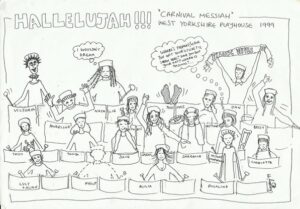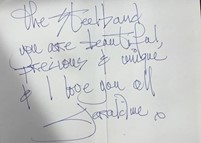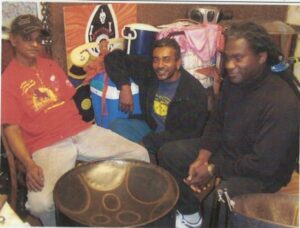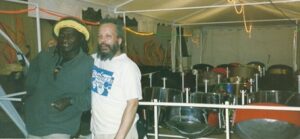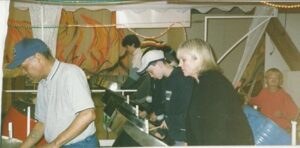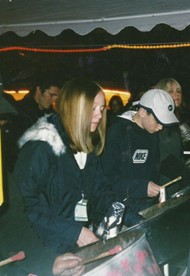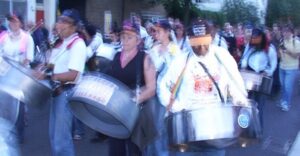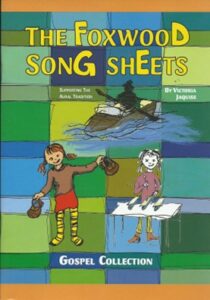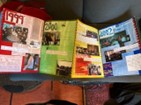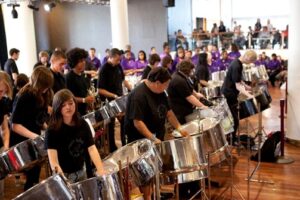Victoria Jaquiss; The musical, inclusive, educational lifeline
In which I consider 1. which parts of my own upbringing and schooling influenced my philosophy of teaching. 2. How life got in the way of a plan, and how what I learned in my early years of teaching influenced how I came to discover my general principles and 3. How I evolved musically
And
How my personal life as an ever would-be musician and professional life as a teacher collided at the moment I met steelpans at Foxwood School.
Childhood: The Eternal Outsider
Born Victoria Jaquiss Ewens in Liverpool, brought up around the south moving to Leeds aged 10 going to 5 different primary schools,2 different high schools and then 4 different universities/colleges. 18 different homes by the age of 12!
My father, who was Welsh, kept getting a new and better job. He had left Bridgend [and Wales forever] at the age of 16, and, experiencing anti-“taff” racism, set about losing his accent and thus his identity. We were a white family, and our dad, I think unusually, coached us repeatedly in anti-racism before we ever met anyone who was a different colour or heritage from us.
We were living om Gloucestershire when I first felt the taste of stardom. The Brownies went to the panto in Cheltenham, and sat in the front rows. My mother sat in the row behind. At the end they asked if four people would like to come up and sing a song. I was the fifth, and I wasn’t going back. They kept me on. I sang Once in Royal David’s City; when I got the end of the first verse the actors said thanks started to clap. I told them I hadn’t finished. I think I sang all five verses.
I knew I wanted to be a teacher from the age of 5, and I also, from the age of 7 I also wanted to be a rockstar. Then two things happened 1. to wreck this second plan also and 2. to keep the dream alive. Firstly, the singing teacher at my primary school in Worcestershire told me I was singing out of tune and therefore couldn’t be in the concert and secondly I started eight tortuous years of piano lessons [after begging to learn to play, cornering the market in the two most uninspiring piano teachers in the UK].
I learnt two educational things from this, about rejection and engagement, and on a personal note decided not to put my own children through that number of school, accent and friendship changes.
Fortunately, my form teacher recognised an aptitude for writing and encouraged it, and I decided to be a poet instead, but I was still traumatised after the singing put-down and I didn’t sing aloud again until I was 28 except nursery rhymes to my two oldest kids when I knew nobody else was listening.
When I left to go north, Mr Parker, the form teacher asked if he could keep my composition book. He eventually sent it back to me with a letter saying that perhaps we had a future George Elliot. I corresponded with him and with headteacher, Mr Matthews for a few years [me aged 10, them both 60, both retiring the year after I left].
Leeds the first time: the High School years
We moved to Leeds, a year and a half at Harehills County Primary. Here Miss Fielding was cruel and racist. I knew she was only giving Martin Goldman the ruler because he was Jewish. They kids laughed at my southern accent. I see and hear myself now sitting on the back row howling “I want my mummy!” The student teacher however played a piece of music to us, and got us to draw it. Fingal’s Cave remains my favourite classical piece to this day.
I told my piano teacher I liked it and had bought a single of it. She got a piano version of it for me, I guess desperately trying to find something I might practise. Then I wouldn’t play anything else.
I stayed at Leeds Girls HS for a whole 5 years, where I was constantly torn between fear and courage, and rebellion and conformity. Learning came easy to me, but in the case of French and Latin that was as much down to two excellent teachers [Miss Noakes and Miss Smith]. I decided I must be good at languages but sadly the Russian teacher didn’t have the knack. Kathy Chambers and I used to compete with each to come first and second in everything. Only a friendly rivalry. I sat next to Sarah Brown in form time and sadly watched do her music homework.
Music lessons, as I recall, consisted of singing. There were a few of us who uncomfortable with this and one day we joined together in holy row of out-of tuneness and a “singing” a different song to the one she teaching and playing on the piano. Miss gave us all detentions. One at a time we waited at lunchtime to go up to the little anteroom above the hall where there a piano. In entered. She played a scale at me, and barked, “Sing that!” Taken by total surprise I did! “Well, it’s not you that singing out of tune!” she shouted at me and ordered me out.
Not out of tune! A little glimmer of hope.
My dad took me out of Leeds Girls after year 11 basically because I got kicked in the face by a horse on a Biology trip and they didn’t immediately drive straight back to Leeds to take me to Casualty. They didn’t take me back because I wouldn’t let them. Their crime really was letting me out of their sight!
I went from an all girls’ all white posh direct-grant grammar school to do sixth form at Allerton Grange, mixed girls and boys, and here I met children also from different ethnic backgrounds. I was tout of my depth. They thought I was a snob. I probably was. I longed to join in; instead, I truanted every other day for two years. My dad was barely at home. He lived in London during the week which he obviously preferred and would appear at weekends to shout me and my brother. Once he was walked on us on Christmas Day because “the turkey was undercooked”. I was 14 then. We all just cried.
My parents who didn’t have university degrees, always, always, always said, “When Victoria goes to university . . . . .”
I was trapped
Liverpool again
I failed to get into uni to do English and so I returned to my beloved hometown to take Russian instead, did a year of Applied Languages at the College on Tithebarn Street, then on to Liverpool Uni itself. This disappointment was softened by having to reread Dostoevsky Tolstoy, Chekov, Gogol, Sholokov [who probably didn’t write And Quiet flows the Don] Pilnyak and my absolute favourite: Turgenev [all in English obviously!] I finally escaped uni with a 2:2, having decided to include having a baby during my second year. [Reader, I just took him into lectures with me. He never cried].
There were two reason I applied to Liverpool University. 1. I didn’t want to be an interpreter or a translator. 2. The expectation that I would go to university was eating away at me. And I felt that, unless I went to something called a university I was destined to spend my life feeling a failure.
I remember the day I was freed. To get your exam results you went into the department corridor and looked at the list on the wall. And with that I was released from my obligation to my parents. I was wearing over the knee pink suede boots with home made purple velvet trousers and purple silky shirt. I looked at the list, took the boat over to Birkenhead, walked to Tunnel entrance and from there hitch-hiked to North Wales where my mother had taken Baby Walter on holiday.
And I set about unlearning everything I learnt at university in an inner show of defiance to nobody but myself.
On degree day, my parents were meeting for the first time after divorce. Great. I wore the shortest miniskirt I could. I refused to have the official photograph and stood on and then in a bin outside the Philharmonic Hall. This was meant symbolise that my degree was rubbish. This gesture was wasted on the parents who thought I was having a laugh.
Why didn’t I stand up for myself? Maybe with all the upheavals, I was never on stable ground. Maybe that is why I wanted so many children. Who knows?
Quite unqualified, I taught French at Wallasey Technical Grammar School for a term I was petrified. They asked me to stay on [they were desperate]; I refused and told them I was rubbish and in January started at Ethel Wormald School of Education. Five of us, who were recent graduates had left by mid February.
Blackburn
From Liverpool [and Wallasey] I next moved to Blackburn, where I worked as a petrol pump attendant, a bar maid, an art school model, and a EAL teacher to the lovely Asian women who lived all around us. The racism, which I had never really met before in person was so vile that I instantly signed up for this community teaching job plus other voluntary work for the Commission for Racial Equality. The same day that the Lancashire Evening Telegraph printed this letter of mine, someone sent round the undertakers, dressed up in top hats and full outfits to my house at 10.30 at night to take away “the body”. Len Proos, the Head of Commission said it happened all the time to him. I gulped.
Single again now in Blackburn, writing prolifically, realised that my poems were actually song lyrics. I asked my songwriter friend Peter if he would put them to Music. He said you’re going to have to sing aloud now, and instead he taught me how to play chords on the piano. And I sang my words aloud.
Leeds Again the Indie Bands
Next I found myself back in Leeds now a single parent of two children, and taking my PGCE in English and Drama. Here I met Ashley. He was doing maths and together we formed Open to Offers, an indie band, with guest players, in which he mostly wrote the music and I mostly wrote the lyrics. We gigged round the locality and we played lots of little clubs around Leeds including the fan club (where we were engaged by the now legendary John Keenan) Royal Park pub and some bar near the station. I sang and played bass, buying my first bass, a Hoffner semi-acoustic from then boyfriend who played bass in a local band called the Alwoodley Jets.
Musically Ashley and I went our separate ways when we both started teaching and I joined a punk band called the Ankh, in which I just played bass guitar. Richard taught me every single note, and they were sparse, so it was easy. My second bass was a Fender Musicman, totally wasted on me but looked cool, It was so heavy for that for the first few months I put a cushion under the strap on my shoulder till I got used to the weight.
Next band was Sheehee (comic and being girls) - we were me [bass], Sally [vocals and comic guitar] and Jackie [keyboards]. We were girlfriends and ex-girlfriend of the Mekons, and fed up of just following the “boys” around. We weren’t very good; we intended just to be funny and when someone came up to us in Nottingham and said are you doing this for a joke; we pretended to be offended. We didn’t last long. A few articles in the NME, one by friend Ziyad and a picture of me and Jackie. We were interviewed two years ago for a book about the post punk legacy in Leeds. I told Gavin Butt from Newcastle Uni that I didn’t know why he wanted to interview us Because we were rubbish; Gavin said, Funny, that’s what Jackie said.
After Sheehee Charlotte [more anon about Charlotte], Teresa and I were Wirrits. Later Linda joined us on violin. We so used, as women going into the venues, and someone always asking who the band was and us saying, We’re it [Wirrit].
The next outfit was the Belgrade Astros with himself [Rick] on keyboards and Rick’s friend, Steve on electric guitar and drum machine. I played bass and sang again. We wrote together-ish, and our first and only gig was supporting the Three Johns in the Tartan Bar. Rick and Steve told me at the soundcheck that they would leave me on stage on my own if they got too nervous. Someone came up at the end and told me they really related to the lyrics of a particular song. A friend of Rick’s who was in the scouting for talent business paid for studio time for us. We were proud of our little three song tape but the friend wasn’t impressed and we split up as a band [though later Rick came to be steelpan widower as mentioned elsewhere].
Then three more babies [between us] later, Charlotte and I teamed up with Daisy [daughter] and Dave to be Swanyway. The height of my ambition was for us to support John Otway, which John Keenan obligingly arranged for us, at the legendary Duchess on Vicar Lane. We were not great, but at least the photos are good and there are no recordings. And we made up for this by supporting Otway much later at the City Varieties with the Foxwood Steel Bandits and re-endeared ourselves to John and John.
Foxwood and Section 11 money
StClair Morris
StClair Morris, originally from St Kitt’s, who was employed by the Leeds Music Support Service to be their first peripatetic Steelpan teacher. We stayed friends to his, to my mind, untimely, death three years ago. I had been “interviewing” him for his life story. We drank lots of tea and reminisced, but not enough writing was done.
Section 11 money came from a government act; it stated that funds would be given to any institution who could use them to fight racism and promote multi-culturalism. Lots of schools bought pans. At Foxwood Mr Spooner bought ours as positive example of black culture in all white school where the National Front was literally and metaphorically banging at our gates. The music teacher didn’t like pans and because of my history with Commission for Racial Equality and because I was playing in these local bands, Mr Spooner then asked me to learn to teach and play them. I said, I’ve never heard of them. I will go and have a look.
Well it was love at first sight. These huge rusty pieces of old oil drums just melted my heart. I liked the idea of celebrating black culture and achievement, but very quickly I saw these instruments’ infinite possibilities, and in particular for inclusion. Great for the talented ones, but some pans had large playing surfaces which meant those with poor coordination or lack of confidence could still easily play a note. Thus classmates of differing abilities could make meaningful sounds together. Plus they so easy to quickly play them well. And playing recognisable songs or just making nice sounds quickly calmed the most savage of breasts.
The Music Service bought a van and a set of pans and let StClair loose on them. He drove from school to school; the kids would come out to meet him carry the pans into the school, learn the tunes, then carry the pans back to his van, then he would drive to the next school and repeat the process. So practising between sessions was not built into the system from the start. .However at Foxwood we had bought our own pans I ran round the players making notes and we tried to practise during the week.
StClair was easy-going and generous with his knowledge, and put up with me scampering round him making notes and asking questions. He taught us pop songs; some the Foxwood Steel Bandits play to this day. He also had his very popular Paradise Band and they played everywhere. In fact he was playing in Glasgow four days before he died.
Two more things happened in quick succession to complete my happiness (well, three of you count meeting the father of my next two kids, and lifelong steelpan widower).
Jan Holdstock
I went on a secondment at Beckett Teacher Training College, where I met and fell in awe of composer SEND music specialist John Holdstock. She introduced me to colour coding of chords, to grades, to using titles and first lines for rhythms. She also got us to put words to music. I wrote a blues song called Rats about the Pied Piper, and even more amazingly, sang it aloud to her while playing my three chords (A D and E) on guitar (which I had been teaching myself). The following day Jan reappeared at college with my song properly notated. So my squeaks were actually real notes! Ecstasy! Eureka! [Here’s the lyrics, got her notation somewhere!]
I also met Gordon Parry who I was later to work with ay Green meadows Special School. Hebtaught me how to change chords on the guitar without looking, and , between him and Jan I came across lines of music set out 4 bars at a time. And also, bars set out in equal length spatially as well as musically. (This eventually caught on with quite a few music publications). Conventional music still has a bar with a semi-breve taking up less space on the page than one without quavers. I can see why, but it is a big leap to take . . . .
Between them Gordon and Jan chucked out all this information at me and I ran round collecting up all the bits I wanted. Only one bad moment, but also one amusing moment. A man came in one day and he said he could teach anybody to sing who had been told in their childhood that they couldn’t. It wasn’t long before I fled the room in tears.
What was the difference between the man and Jan’s approach? Why, if I was singing in bands were there times when it was just back to Square One, aged 7? Using a mike helped
Playing in My chosen key? Alcohol even? I did used to have a drink before I went on stage. But Jan had the technique, which I use all the time. You don’t tell the student what you are doing; you general avoid eye contact; you make it sound like it is not a big deal.
Amusing bit: as part of this course we had to learn a brass instrument. I have never been able to make a sound out of one before so I was quite pleased to make some sounds and even some notes on the trombone, so pleased with myself in fact that I said I might take this up afterwards. The brass teacher looked at me and said kindly, “Don’t”.
Rules Ignore Praise
The next amazing course was on behaviour management, presented to us by the methodical and knowledgeable Mick Pitchford, chief educational psychologist for Leeds. This course was highly prescriptive. Very intense. We watched his videos of children crawling under tables and how he gradually coaxed them into a love of learning and cooperative behaviour.
Hardly daring to believe it would really work I used it in all prescriptiveness. In the classes with a large proportion ofstudents behaving badly it worked; in the other class the children didn’t see the point and wouldn’t cooperate.
Back at school I watched several music teachers drop like flies including my friend Kevin who sent me this message on a beer mat when I asked him if he would come back in and teach a couple of lessons. I said to Mr Spooner (who eventually did become Bob to me) “Make me head of music. I’m sure I could do better than that” Having met pans, and having met Rules, Ignore, Praise and seeing how these kids were, I was highly motivated to take on this challenge.
The 80s Foxwood Steelband is born
About this time I met the collaboration of my life in the form of Charlotte Emery [mentioned already as band mate], who remains one of besties to this day. She also joined Foxwood School as an English teacher. We found that we both lived in Hyde Park in the next street to each other. Plus she was one of lead singers in local band, The Magnificent Seven. She had done her B Ed, at Beckett, studying Music, Art and Drama, also had studied with Jan Holdstock.
In the late 80s I was now Head of Music, Head of Community Studies, English teacher and Chair of the Equal The Opportunities Working Party; Foxwood Steelband was a regular feature at the summer fairs of Seacroft, Gpton and Killingbeck; I was driving the school minibus and also trailing the school trailer. which had been acquired for the school’s go-karting team. I also lost them two trailers, one from the Garforth Arms in Garforth, and one from my back garden which very much left my lovely Volvo Estate finally expired. The school and the go-karters accept the losses with equanimity.
Before the loss of said trailers we had become quite well- known locally in Leeds and also further afield. Colin Jones the head of the Music Service invited us to play for a visiting German party as part of a concert at Leeds Town Hall and Lindsey Council in Lincolnshire regularly invited us to play at Gainsborough and Market Razen.
I was quite unaware of the research at the time of the benefits of playing and listening to music and to playing in a band. All I know was the music department and the steel band became safe havens for quite a lot of students, talented or otherwise. As long as they were playing it didn’t matter how good they were and in fact the more they played the better they got. And this concept of talent was never the most important. It was about need and hard work.
One Sunday afternoon we were driving back from playing for a yacht that was about to sail round Britain or the world or somewhere at Leeds docs. One girl said can you drop me off last, I don’t want to go home. I pretended I was unaware of the significance of that but took the information in the cold out to the rest of the band okay who wants to be dropped off first. Open nine members of the band that didn’t mind being dropped off first there was only one, and that was the only boy. All the girls wanted to be dropped off last.
Difficult life circumstances and poverty still protect pertained. Behaviour still was a challenge. Abused children didn’t come to school with any automatic any love for authority or respect for teachers. Often they didn’t come to school. And our home visitor, Margaret Neat, would go visit them. I helped 2 parents to be put away, that is convicted and jailed for offences against girls. I attended funerals.
All the time working out ways to engage students as soon as they enter the room.
Foxwood Songsheets – the Beginnings
Still using the behaviour system not always so prescriptively adapting it for each class. After meeting Jan Holdstock, I began to devise an imprecise system of notation which combined written and aural methods and which provided the absolute minimum of of information in order that somebody would meaningfully be able to play a note or a chord. How it works as described elsewhere on the website. It took five years to perfect (though I’ve been tinkering with it ever since) and it takes about five minutes to learn to use (although sceptics and other musicians take longer and this is understandable as it goes against the grain of how they’ve been taught both to read and to teach music, both those playing aurally and those with formal notation).
The Great Leeds Schools’ Reorganisation
In 1992 came a Great Leeds Schools’ Reorganisation, and the end of middle schools. Charlotte became Head of Music at Merlyn Rees high school, South Leeds and I now became Head of Expressive Arts at Foxwood, now pointlessly renamed East Leeds high School. But I now have my next partnership with Pablo Phillips. Between us we devised the listening scheme which we use every day for all of our classes from year seven up to year 11. This is totally engaged the children; in fact they used to try and find out what the pop song of the week was from the other classes.
The OFSTED inspector said it was the best listening scheme she’d ever seen and advised me to publish it. I thought that might be nice but, as a music teacher confined to one locality the idea that this might be a possibility never entered my head.
Girls on drum-kits
This inspector was a music specialist. she stayed with me all week. In my departmental handbook I explained my technique for getting girls to play drum-kit and keeping the boys off it. This was done by having a kit that was for girls only and getting the girls in question on it with a non-committal instruction and no eye contact. And, before the inspector’s very eyes, Amanada B turned up, saying she wasn’t playing kit for no one! I called over, Suit yourself but there is set up over there for you. The inspector was suitably wowed as Amanda condescendingly walked over to play it. At one point I was singing to the class the song I needed them to play on their own instruments and they were laughing at me. The inspector said I’m an alto as well and sang along with me.
[Later on Amanda attended the East Leeds Training Centre, set up on the school premises. Interviewed on local tv she declared that the teachers did nothing for her. She was one of four in the same family who were most “challenging”. When the parents turned up at Parents’ Evenings the teachers formed an orderley queue to talk to them. Actually, the staff always outnumbered the parents at these events. We really were in loco parentis.]
We passed our Ofsted, yet when the council came in to explain why we and Cross Green School were to close and merge they announced publicly it was because we had both failed our OFSTEDs. They couldn’t even be bothered to changed the rationale; they expected our low academic grades to go against us, but they didn’t reckon on an OFSTED inspection team who knew good quality teaching when they saw it.
I didn’t invent the song sheets or the listening scheme for anything other than to use them to teach the children of the Seacroft and Gipton estates. I never knew there was a world outside.
Closure of Foxwood School
When we were fighting against the closure of our beloved Foxwood School we were not fighting for our jobs; we were fighting for our children. Those of us who stayed over the years (and I have been there 16 years) had all done the course and/or worked out the way of managing behaviour in what was truly a difficult school. Despite the home circumstances and the terrible reputation that the school had unfairly accrued, we did what the best we could for them. But the best we could have done would have been to have kept the school open, and we failed.
Inevitably the lack of academic achievement took its toll on our school. We have done everything we could to look after our charges but poverty blighted everything at home, and league tables which very clearly demonstrated that poor and abused children didn’t get good academic grades was the nail in our coffin.
The school closed in 1996. I was heartbroken. Many of us were. Four ex-Foxwood teenage boys hanged themselves that year. David’s father turned up at the funeral handcuffed to a policeman. It was unbearable.
I did not have the heart to attach myself to any other school but was headhunted by the Music Service who wanted me to be Steelpan development officer on condition that I also did .5 a week in all the special schools for children with challenging behaviour, which I had inadvertently become a specialist in without knowing it. So that was why the music advisor and head of service kept calling in at our school to watch me teach. the other Members of staff used to tease me about it. Your friend is here they would say.
There was a curious thing happen. Back in the day teachers and school staff didn’t get made redundant. Leeds found them jobs on other schools. But on this occasion they need to staff Copperfeilds College, the new shiny white element housed in the old Cross Green Building that was the the merger of Foxwood Cross Green. The man from the education office came up to the school spoke to us reassuringly. He told not to worry about the stigma of working at Foxwood, but that they offering £2000 sweeteners to other for taking us on. Stigma! We were insulted and amuised. The first one to be offered a job without the sweetener was Beverley. She didn’t need to go through the humiliating awkward process that the competing with some from Cross Green for your own job.
I promised the students I would try my best. Richard Harrison and I both interviewd for the Head of Faculty of Expressive Arts. I told Richard that it was his old school [as in the building and he should get it]. That evening we were both rung up to be told that neither of us was good enough, and rather than reinterview anyone else they were cancelling that post. The truth seemed to be that they had made so many senior management appointments that they realised that they afford this one.
I took them to appeal, lost 2 to 1, then made my prepared speech. I said that it wasnmt me that had lost this position but that they had lost the opportunity to employ someone with a track record running a department and a group of peripatetic teachers, someone who had the second highest number of GCSE entries in the City, someone with a great Ofsted report and someone who had a famously successful steelband. And set up throwing the next. But it was touch and go.the more I threw the things I was told I was no good at, such as assessment [Quote: you can’t quantify a good performance, you just feel it, Quote: I always make sure that classes understand that Tchaikovsky was gay and hounded by the state it [I did do that, especially after Section winged its cruel way into our schools]
Copperfields lasted four years.
Foxwood after Foxwood closed
When Foxwood closed we were told to pack everything away in boxes, label them, then leave them for the professional removal men. I was due to take my GCSE year 10 into year 11 at Copperfield College. No way was I entrusting my recordings or paperwork to anyone.
All the English coursework was lost.
We played all through summer again. And now we didn’t have to tell people they couldn’t play after they left school. I sought ex-players out. I also sought out Charlotte. She played most weekends with her new band at Merlyn Rees, and played with Foxwood whenever she hadn’t got a Pantasia commitment. Foxwood Steelband was dead; long live Foxwood Steel Bandits
Leeds Music Support Service
I sat at my desk in the office at West Park both lost and excited. Hadn’t planned to be a specialist in one instrument and hadn’t planned to be a specialist in special needs (as it was patronisingly known) and or inclusive education (as it is euphemistically known). [ I have been searching for years for what I think is the right terminology. [presently I favour differently wired and differently able].
It was difficult at first as a peri, in fact it has never been as personally and professionally satisfying as being part of a school staff. You’re on your own, you’re on the road. I used to like meeting the same people every day discussing various children’s needs with colleagues, working out how best you could support them. I needed someone to fall back on when things got tough, somebody who had experienced the same problems. Then I was teaching the child, now I was teaching music.
But with league tables, OFSTED, and the privatisation of schools schooling is not the same. It has become all about the grades and competition between schools. The parental choice was only ever between which school to send children to. In my opinion all kids should go to their local school where they will be safer.
Another thing I have found about Music teaching is that most teachers teach as they learn themselves without questioning this. They routinely forget that they were the chosen ones when they were at school – with talent or aptitude or perseverance or supportive or rich parents. (What didn’t make them good musician s was the routine teaching style.
My disadvantage as far as being a teacher goes was in fact my greatest advantage in the end. I wasn’t a chosen one. I see things from a different perspective.
But I also felt imposter syndrome keenly. Everyone else in the office even the admin staff was a musicians, either classically trained graduate or world music virtuoso. I was just a great teacher. They used to sing happy birthday to each other in the office. There was about 10 of them this is 10 times a year that I was working out how to avoid the situation or divert attention from the fact that any attempt at singing with a load of musicians was going to completely close down my throat.
It was upsetting because I I would open my mouth and just not get it. I desperately wanted to be able to join in and I knew that if I put my mind to it and dropped the nerves that I could probably do it. It’s the same at home with the kids’ birthdays. I don’t think it’ll ever change. However, I am perfectly happy to sing within my one chosen key which is A. I will sing to classes on my own terms,one of these terms usually being that we’re in A. This could be my natural comfortable pitch or it could be because this is the easiest key to play on a guitar. (Struggle a bit with F sharp minor!). I took singing lessons with the lovely Annie Raw, who specialised in supporting people who were told in their youth they couldn’t sing.
The head of service said he had to fight for appointment. At first I took this as a compliment; when he retired I realised I was left with the people that he had fought. Of the other two pan teachers, one welcomed me and one saw my existence as Steelpan Development Officer as threatening his position. As we had been friends I was hoping he would welcome my support. He didn’t.
It came to a head one day when he asked the Head of Service for a meeting with him, the Head of Percussion and myself. The meeting ended with these famous words, What is she doing here? She is not even a musician! The Head of Service closed the meeting saying, This is too cruel and left this wound gaping open.
The job title I had at first was Steelpan Development Officer. It was a big drop in status from head of faculty and not having any real authority I could develop all I liked but there was only me carrying things out. So I did.
I was asked to run a city-wide steel band with a colleague who would only teach with the aural system. He was actually a musician before he was a teacher whereas I was a teacher before I was a musician. So he did the “teaching” and I supported. We invited students from all the schools we taught at and I also brought Foxwood students who had been with me for years. We started the lessons at the West Park Centre in north Leeds. Most players lived in East Leeds. I borrowed the minibus from either Agnes Stewart High School or Fearnville Special School, and went round collecting them all; then took all the players back and at about 9 o’clock I parked the bus in whichever compound, locked and took all the keys back the following day. After a couple of years the head of Service kindly offered to release me from the this unsatisfactory situation. [Later I did source a community centre in Harehills for when we rehearsing for Carnival and Carnival Messiah. People, children in particular did not like moving out of their own locality. And rightly so. I certainly don’t.]
Leeds Silver Steel Sparrows
I set up my own citywide steel band. I based it a City of Leeds School where my two youngest children were about to go, and there were lots of children from the local schools that I thought it were going. Steelpan in schools at this time was absolutely thriving. I taught at Hillcrest. Leopold, Blenheim, Little London, Quarry Mount and Royal Park all feeders to City of Leeds, all well used to Foxwood songsheets and within months we were gigging round the old folks homes, churches and nurseries of Hyde Park and Chapeltown. Two favourite story from the early years: 1. In the morning of the gig at Bethel Day Centre, which half a mile down from the school, I packed the van a, took the pans to the centre and carried them inside; at lunchtime met the players to walk down. Walking? said Azekaya, I’m not walking! And with that he went back into school. 2. We were at the Royal Armouries playing a welcome party for the Chinese ambassador. During a break I found Elise half way down a glass of wine. You can’t have that, I exclaimed. Oh it’s okay, my mum lets me. I removed the glass.
I learnt about Music For Youth in 2004 by chance, and entered it. My drummer [with ADHD] stopped playing halfway through a song. I learnt that you had to be more than excellent; you had to be perfect. The following year we were perfect, winning through to the National festival of Music for youth and playing at the Birmingham conservatoire. We got through six consecutive times, and in 2009 actually made to the Royal Albert Hall.
Later I was to meet I head of a nearby northern Music Service, who told me and the all the teacher trainees that I was doing a pan workshop with in Halifax this great story.
It was the conservatoire ,the first time that we played Music for Youth in Birmingham. He said everybody looked up in surprise as I led onto stage this group of ne’er do wells (might have been something slightly more uncomplimentary). The judges looked up at us and then looked back at the writing pads. Then as we started playing all of them slowly raised their heads in astonishment and watched the whole 15 minutes without putting pen to paper.
As we came off stage, one stagehand said. Don’t worry about what they (pointing to the judges) think, you and that London band did it for us!
Bradford City
In 1999 Bradford City Football Club got through to the 1st Division. To celebrate, amongst other things, they visited Jamaica and two made a CD with them singing Three Little Birds. They contacted City of Leeds where I was doing a little voluntary toe-in-the-door after school club. Several of my players from their primary schools were there (Kimberley, Rachel etc) and I wanted to give them to have the chance to keep playing.
Over to a recording studio in Bradford. The music teacher, Miss Hardwick was a great supporter of the pans, and was very keen to have a good steelband at her school. More anon about City of Leeds and how it became a second school home to me. After we left having played our Bob Marley tune endlessly, we went back and at some point/later the team came and sang to our recording. This was so unchildcentred of the organisers. One of the attractions of doing this apart from the excitement of day off school for the kids, and tons of extra unpaid work for the teachers, was that we would meet some celebrities (who were actually famous for winning something hard), take photos and put them into the our bank of memories.
Music Centres
As mentioned elsewhere have been given up on jointly developing a citywide you steel band, I felt I had no option but to start my own. Also at that time we agreed to bring steelpans back to Music Centres. The old Foxwood building was being used as a training centre so I arranged to hire a room and start the satellite class for East Leeds music centre there. This class eventually moved into Parklands school and where ELMC was based and East Steel was born. We had lots of mothers and daughters and so I asked Anne-Marie to design a logo that included a rising sun/steelpan and included a woman holding hands with her daughter. When North Steel was born at Northwich Music Centre I added the North Star to this picture and now Mean steel has been born at Meanwood Community Centre I am adding two trees for the wood.
Xanthe, then Natalie took over East Leeds; I went on to set up West Leeds; Becky took over West Leeds; West Leeds moved to City of Leeds School, so big now that Becky and I ran together, then when that became an academy and all the pan classes got chucked out, I found Swarcliffe and left Becky there while I set up classes at North Leeds, then I moved on to Horsforth Music Centre leaving Jermaine and now Helen taking North Leeds. For the last ten years my friend, and fellow band member, Wanda has stood in taking classes here and there as needed. Super-sub.
Meanwhile over in the south, Merlyn Rees had became South Leeds School, Pantazia became South Steel, and when South Leeds became an academy the band now became a community band of ex-student and staff players. And band leader, my fried Charlotte and I would often guest for each other as needed. I always saw classes as potential gigging bands and created the notional Foxwood Panyard, an association of Leeds steelbands, all using the Foxwood Songsheets to teach with, all except Foxwood Steel Bandits taking all comers.
Carnival, Carnival Messiah and the Hallelujah Chorus
Carnival
I discovered Carnival rather late in life in the early 90s; it was awesome, so when I was invited me to play with New World in 1993 I felt all my boats had to come home at once. We played on a tractor pulled trailer. We were a mix of school students and the music college class players. Dudley chose and taught the songs. I organised everything else.
In 2000 Dudley decided not to do Carnival anymore so I told Arthur France I would do if he wanted. He gave me a cassette of current Trinidadian road songs. We chose the Magician. Dave worked it out. I taught it and did all the admin and driving. The promised drummer never showed, so a friend’s son played kit for 3-4 hours then was in no state to play for several months. One time we were the only steelband on the road. Sometimes North Stars from Huddersfield was there too. Here we are in white on a float with the Archway Crew
I put together Foxwood Steel Bandits, East Steel and Leeds Silver Steel Sparrows to form a huge Carnival steelband that Leeds could be proud of.
In 2004 they didn’t want us on the road anymore. I told Ian Charles we had 30 people who had worked their holidays around this event. He said we could have the mainstage; he was ill on the day and they didn’t get the memo. The woman on the stage gave us the piece of mud in front of it. Ian was apologetic and the following year we trod the boards themselves. The sound crew was packing away; they hadn’t got the memo. I asked the engineer if he knew Walter Jaquiss. (My son by then was a sound engineer) How many mikes did we want? Here we are on the mainstage with Foxwood Steel Bandits, East Steel ad Leeds Silver Steel Sparrows.
At the Carnival debriefing Natalie’s sister told us that someone suggested they put the steelband back on the road as folks were leaving the parade to come and listen. My colleague John said he and his wife were dancing to us in their front garden a few streets away.
From 2011 we were no longer required. This is when I went down went down to Notting Hill to experience the exhaustion that was the full weekend. One year Sophie came with me, one year, Rhiannon.
Then Annette, a Sparrow’s mother and friend asked to play Savile Park while she waited for the parade. She had recently been diagnosed with cancer and thought this would be her summer. It wasn’t. I was to see her remarry before she died three years ago. Why did the best die young. Georgia, Claudia, Natalie and I played at her funeral. It was lockdown days. She would be pleased that her daugher Claudia now plays with Foxwood.
But ever grateful to Annette for her pushing us to do this. The following year we popped up again in Savile Park; the council photographer filmed us as part of the official carnival. After that various shops opened up their patch of pavement to us. And we got a burger and a toilet. Ace.
The Hallelujah Chorus 1999
Enter Geraldine Connor, international musician and now working at the College of Music. I had first met and been blown away by her in 1990, while on my last maternity leave. She did an introductory course on Carnival in which I learnt absolutely nothing about the origins of Carnival but it didn’t matter. I was in the presence of royalty.
She wanted us to play the Hallelujah Chorus for a musical that she was putting on at the Playhouse. I was already playing classical music on steelpans with my students, and playing snippets of familiar tunes using my Listening sheets because I was trying to
1.empower them in society so they were able to recognise a bit of Mozart and a bit of Schubert and the rest in front of their middle class colleagues and friends of the future.
2.Open up the world of classical music through its most popular pieces. If they liked Tchaikovsky they might go onto like someone less well known, less mainstream, others just might go on liking Tchaikovsky (as I do)
A digression on classical music on pans and in schools
Going back to the listening scheme - this involved the children listening to a different piece of classical music (and other styles) every week, which meant that they would have listened to 90 different pieces of classical music during KS3 and listened to it while counting the beats naming the instruments, naming the style, making a choice about whether they liked it or not, etc.
One day at Foxwood school I was just starting the 1st tune, playing it to the class when Richard S burst into the room. Oh no! he laughed out loud, Not Hayden’s bloody Surprise again!
I told him he should be in Art and packed him off. Inside I was buzzing. * (a version of one of the listening sheets is in Including SEND in the Curriculum by Jaquiss and Paterson, published Routledge)
Meanwhile back at the Playhouse, I had taken over teaching the Chorus. Dudley N had a role as a travelling pannist in the show and didn’t really like teaching classical music. I wrote all 94 bars out in Foxwood songsheet but contrapuntally. Two people were using conventional music for their parts, some people who learning it from other players. Others were teaching themselves from the song sheet.
The work we put in behind the scenes was immense and intense.
Geraldine’s original plan was for a community group who hasn’t played pans before to learn from scratch and therefore learn a new skill. And this was the basis for the grant for the Arts Council . But his piece of music was way beyond something you would learn from scratch in five weeks and then present at the required standard. So I brought in half of Foxwood Steel Bandits; Charlotte brought in a couple of school players; there were few players from the college of music band. We weren’t being paid, we were doing it for love, and it was lovely. I made a grid. The players told me when they were free and I made sure that we had enough players in each of the SATB sections for each night. I was also setting up, counting in, generally being in charge without it being formally acknowledged. Michael Steele the American music professor and pan musician himself took my hands in his and told me what I was doing was exquisite. Geraldine wrote a card afterwards saying how wonderful we are. Payment enough. Until the next time . . . . .
Next Carnival Messiah run [in 2002] did nothing much to forward my educational thinking but it told me some very dark things about human nature. I will leave writing about that for another time.
European Steel Pan Festival in Sete, France
They wrote to the music service, did we want to send a delegation from Leeds and /or a steelband. Well, we did. We were six of us, some from the service [admin and teaching staff] and the others from Leeds schools. Because I didn’t fly they all agreed to travel on the train with me. It was miles, it was on the south coast. Yes, the South of France. Steelbands came from all over Europe and performed at the festival in different squares all round this beautiful town. UK was was represented by London based, Ebony who won the overall award. Bands came from Holland, Germany [Pan Kultur], Sweden [played lots of Abba], Finland, Switzerland, France, maybe others.
One thing struck me. Foxwood Steel Bandits would have been good enough to play here. So why did I think we wouldn’t have been!
The performances and the staging was amazing. And to top it all the presentations and the debate between all the pantuners [who knew there were pantuners in Europe or even steelbands!]. I saw Ellie Mannette, one of the original panmen credited with invented steelpans and with Andy Narell, rated top player in the world. He was the only person who a pan solo [on double seconds] who I enjoyed listening to.,
In the five days we there we met and spoke to may people. Most significant for the Leeds Music Service was meeting Lionel McCalman who at that time was leading London marching band, Nostalgia. He asked me where I bought my pans from. I said Trinidad with a sigh [as sometimes they took a year!]. I always buy mine from Grafton he said. And that was it!
I met Grafton Yearwood soon after, and never looked back. We have become good friends, and besides buying all our new pans and getting the old ones properly tuned, he would let me discuss new layout designs. I was introduced through Nostalgia to the single pans that they used, and now they are nearly all we buy. I have spent 15 years replacing doubles and triples that were confusing out primary school children for singles.
Here is Dudley Dickson, Grafton Yearwood [both pantuners] and Lionel Mccalman [from Nostagia]
Bern and Paris.
From Sete we were on the big European mailing list and in 2003 and 2004, I took my two youngest first to Bern where we became part of an international steelband convened to play this amazing festival in Neuchatel. Paul Francis had just finished building his panyard. I have longed for my own ever since. On the right Paul and Lionel and me, Georgia and Morgan in Neuchatel marching in the rack
The following year we went to workshop in Paris with their band, Calypociation. We played in Montmartre in an old cinema where Lauren told Georgia she had the “wreests and the ears of a great panniste”. Everything else he said was in French, which they didn’t understand. Luckily, they are better players than me.
Notting Hill
With Lionel I played Notting Hill Carnival pan de neck several times [and Luton once]. First time I played alongside Sterling Bettancourt, one of the original TASPO players at the Festival of Britain. Usually I played just Sunday and sometimes Saturday evening, but one year I went for the whole weekend. OMG. Tiring. On the right blurry pic of me and Sterling.
Publishing the songsheets
Over the years friends and colleagues had often suggested that I publish the songsheets. It wasn’t till I reached the Music Service that I fully realised that teaching people how to play by showing them what notes to play was time-consuming and excluded children from either learning it at all, or learning and properly enjoying the finished product.
The arguments in favour of teaching using the aural method but was really a visual method were shaky.
1. That is the way it was always taught
2. The nuances in world music couldn’t be captured on paper
3. Committing everything to memory meant that you played more fluently
In answer to this I feel this is put forward either by people who are successful pannists and found it easy memorising and picking things up by ear for music, or they have put forward by people who don’t play pans and I have no idea how difficult this method is.
We don’t know that this is the way it is always been taught; you often see pictures of the teachers back in the day with strings of notes written on boards so some sort of writing down out notes always been there.
[I do also find that people who learn this way play what they think they hear or, if they know the song already, play what they remember of the original, and not the arrangement being offered.]
There is also a difference between people who have pans accessible to them at all times and people who come for a weekly lesson at school for half an hour.
There’s nothing to stop you from learning it from written notes and then committing it to memory or continuing to use them as more of an aid memoir or a prop and do it half learnt, half read.
In rehearsal at the Royal Albert Hall Jamillah took the songsheets for the three tunes were playing, folded up and put them on the floor besides her. I queried the usefulness. I know they are she said, and went on to play all from memory.
Did everyone in Trinidad learn this way or, as somebody once suggested to me, streets were lined with people who tried and failed to learn “aurally” and we don’t know about them. I don’t know.
But what I do know is that everybody has a different learning style., and a teacher herself, who has a million other things to do in a busy day can’t keep these notes in her head all the time.
The songsheets based partly on commonsense ideas from anyone and everyone. Not everything is written down, for example the rhythms aren’t. It is down to the teacher and the class to choose how they will play their chords and their basslines, and what speed, and with what dynamics with which pans taking and which the chords . . . Basically it’s a chord sequence, a melody, a suggested bassline and a structure all on one page, with the absolute minimum of information.
Then as I teach, I see that some people need to be shown what to do at first, but everybody is listening to the phrasing. (I have written about this the Foxwood Songsheets, the Manual, available from Lindsay Music, and the introductory page is shown on the Foxwood Panyard website).
In addition I must emphasise: you may decide to demonstrate how to play a sequence of notes or chords and let them see how you do it. When you have finished doing this you must stop standing next to them, and go round in front of the pan, or leave them to it, and let them then teach themselves. Never hold their hands and certainly don’t reach round from behind and hold their hands! This is disempowering [and inappropriate].
Publishing the Songsheets Again
Astrid (daughter) and I mocked up a manual to describe how the songsheets worked and why I came to this design. and the first three books. These were Easy Classical, Kids’ Collection and World Folk. Emma [then daughter-in-law] designed an amazing front cover, variations of which I use for every one of the 13 books that I have made, Charlotte drew 30 perfect [amusing but not cutesy] illustrations. These songs had to be out of copyright but they were be tried and tested, a repertoire that teachers had been using as exercises for years. Some of the songs I met first when Julian K was teaching Georgia (daughter) to play guitar.
We sent these to 25 publishers and Astrid wrote an article for the Times Ed. All 25 publishers rejected it but the Times Ed took the article and came to Royal Park School to take a picture of the system in action. And, quite unplanned it featured Charlotte’s daughter, Holly. The company that that was closest to publishing the system wrote and they had no proof it worked, but didn’t ask for any. But my IT skills at that time weren’t up to the task of sending proof. I was quite disheartened.
Next the Royal Society of Arts wrote to ask me to be a fellow. I have no idea what that meant but it looked important. I went in to see the head of service and asked what he thought of this offer. He looked at it and said, Oh it must be a joke they can’t mean you. Deflated I went back home and continued with the day job.
The Royal Society wrote back three months later and suggested I can’t have seen that earlier letter and that they really would like me to accept their offer. I went back to the office. There was just one admin officer there and that he said, Victoria are you playing hard to get with the Royal Society [and a few more things besides]? And laughed. So I accepted the offer and became a fellow. This had no effect on my life until it was there 150th anniversary and we were invited to go to the Royal Albert Hall to celebrate this. As an event I found the debate a little less than rigorous but just being there was mind-blowing.
I was eating my lunch on the steps of the Hall, and a woman sat next to me and asked what I was doing there. I explained about the system how I sent it off to 25 publishers and I didn’t know what to do next. Sheila Needham of Needham Griffith said I am a printer. And the rest was history. We became the unlikeliest of friends until her, in my opinion most untimely, death a few years ago. I thought she would live forever, sitting in her elegant terraced house in Roupell Street, Waterloo, surrounded by her plants and boxes of books.
The Foxwood Songsheets were finally published finally in 2004, decades after they were little glimmers in my eye. The sparrows reached the Royal Albert Hall using them. Then the festival Hall for the anniversary of the Festival of Britain, then St Paul’s Cathedral for Barnardo’s [this facilitated By Carole L]]
While all this was happening, and since joining the music service in 1996 I was also a member and on the committee of YAMSEN:SpeciallyMusic. This was a charity set up in the late 80s by Jan Holdstock and Mavis West. As the behaviour management specialist I often did workshops at meetings, then was asked to present in other parts of the country. One thing led to another and I was asked to contribute a chapter in a book to be published by David Fulton’s. It was to read by regular high school classroom teachers who were being asked to include in their classes children with additional needs, needs they were unfamiliar with.
I arrived in Birmingham to meet the editor and the authors of the other chapters. As the day wore on I became aware that this was not a chapter in a book, but a book in a series that their were wanting. I went back to my job share colleague and told her it was a bigger task than I was anticipating and invited her would join me on the project. Including SEN in the Curriculum: Music was published in 2004 Fulton’s. [We edited it. Rewrote it in 2018 as Addressing SEND in the Curriculum: Music published Routledge]
British Association of Steelbands
I went to a couple of BAS meetings. I met more people from the London scene, and Robbie Joseph asked to write to articles, about myself, about my bands. Also wrote about Pans and Inclusion, Pans and GCSE. Pans and Anything. I wrote The Rise and Death Of the Royal Park Steel Pandas. I wrote obituaries for Natalie’s dad, Sonny Marks who drummed and for the Caribbeans, and one for StClair Morris [mine, and Wanda’s first pan teacher]. Both from St Kitts, both massive important pioneers and really really lovely supportive people.
Distributing and Marketing the Songbooks: Lindsay Music
Either with a colleague from YAMSEN:SpeciallyMusic, or on my own I did a lot of workshops with NAME (National Association of Music Education) and its successor organisation Music Mark, and the SMA (Schools Music Association). The SMA conferences were organised by Carole Lindsay and her committee, and also featured her husband Douglas Coombes doing conducting workshops. They featured a lot of others as well, but Douglas comes up later in a highly embarrassing and amusing way.
Carole and this organisation were highly supportive of what I have to offer, and my imposter syndrome starting waning. She also ran her own publishing company (Lindsay Music), amongst quite a lot of other things, and from there sold Jan Holdstock’s books. At these conferences I was using endless pieces of paper and home laminated Songsheets, then the books were published and either I asked, or Carole offered to distribute them for me. I brought out my fifth book, New World. It contained such songs as Liza Jane, One More River and Lazy Coconut. At the Lincoln conference Carole called me over and explained that Lazy Coconut was Actually written by Douglas. My heart sank. This song was in the Jolly Herring book but brought to me by a friend. I used it for years. I thought was traditional. Thankfully Douglas was pleased I thought it was traditional and Carole only asked that I corrected the attribution. After that I have always sent her my list of proposed songs before I even started setting the books, as well being much more careful with the research in the first place.
Cellofest
The Suzuki method of teaching strings basically involved parents learning with their children (see book by Dr Suzuki). They ran international summer schools in Culford near Bury St Edmonds when I first met them. They found me through Kirsty from Hertfordshire Music Service who taught steelpan and cello. She was asked to do a summer school on pans, couldn’t and asked me the rest was history. Penny Heath was overall in charge, and Reuben came from France to teach and arrange the final joint number. Many other amazing people from all over.
They were all amazing musicians, caring and considerate teachers the whole summer school was a musical explosion. The school was a massive old piece of real architecture, and I took steelpans in the library. We were included in the final joint ensemble. V included a section for steel pans. I was treated with respect and that I wasn’t the best pan player in the world was irrelevant. It was a teaching style that they wanted, Not virtuosity.
I have done these summer schools on and off since 2005 and also winter schools and autumn schools in Birmingham, Edinburgh and Harrogate.Through then I met the music teacher from Manchester Grammar and helped him set up his pans there.
York and Gwent
Other places I have helped set up pans or set them back up is York Music Service. I went and taught there for a year about the early noughties. They had unfortunately already sourced a set of pounds from an organisation which didn’t understand the needs of primary schools and so the schools were littered with big basses and triple cellos. York was 30 miles away; I handed over to Alicia and in turn she handed over to Dave who I taught to play pans when he was a TA at Foxwood school in its last year. When Dave, very sadly too young, died a few years back I did eventually go back over to York again at their request and re-taught them to teach pans. And Christian and Billy are thriving. The Head of Service, Dan H, said, Dave didn’t use your songsheets but having seen them in action I can’t see why anybody would teach without them.
I needed that endorsement. The argument about how to teach world instruments rages on for absolutely no good reason.
City of Leeds
In 2002 Sheila Hardwick the Music Teacher, who has been instrumental in getting pans to City of Leeds School, and who had insisted on getting a better-quality set, took up a senior management post and they needed a new music teacher. They asked me. I asked the Music Service if they would second me. I handed over as much pan teaching as possible to a new member of department, found a student friend who was about to take PGCE. He agreed to take two days. I took three. I wrote a course for us both. My own children, both at the school were mortified to see bob up once a week in their lessons.
So I had found myself another home. An office, a huge set of pans, loads of computers (which I tried to avoid) and it was a walk to school. I loved it. They asked me to stay on. Said I didn’t want to cramp my own children’s style, but that I would do it if there was no one else. The music service told me I had to resign down to three days or not, gulp, and without knowing whether they would need me or not, I did.
Gwent Music Service
A new teacher appeared. They didn’t need me. But hey, Gwent Music Service did. After a long phone call while I gave them such advice as I could for which pans to buy, who to buy them from, how to teach them and include everybody, Simon said , “I don’t suppose you’ve got two days a week to come and do all this for us?“
They wanted pans for their ethnic minority students. I told them that was stereotyping and a lot more besides. We agreed to target the poorer students. The brief was to order the pans (from Grafton, and the stands from Andy [engineer Sparrow parent), suitable to 1. To be in four different schools and 2. To be able to put together to make a big county band to play at St David’s Hall.
I organised Grafton to make and deliver the pans, and the first time I went down I put all the stands in my Volvo Estate and drove down, and back . Zzzzzz. After that, every other Sunday afternoon for ten sessions, I would arrive at Newport early evening, book in at the hotel (later as a lodger with one of the teachers). Monday morning, I picked up the hire car just by the station, and set off to the Valleys. Morning in Pontypool, afternoon In Croesyceiliog. Next day morning in Chepstow and afternoon at lunchtime St Julian’s, Newport, drop the car off and take the 5pm train back to Leeds.
Obviously visited childhood holiday haunts in the evenings, Bridgend, Cowbridge, Porthcawl. One week I took Morgan (youngest son, then 13) with me. I loved the whole experience. The musicianship of the kids in the music room at lunchtime at Croesyceiliog! Eating sandwiches and blowing trumpets.
The teacher training but didn’t work out. The person they had selected to take over from me rejected the Songsheets, and said, I think I will use the traditional way. I was gutted, I had already reached the point where the kids did concerts without depending on me to be there. Next time I saw the Gwent people was at the Royal Albert Hall and they said when they put the steelband on in St David’s Hall, it was members of the orchestra who crossed the stage to play them. I offered to go back. No money now.
Good news though. City wanted me back as an extra classroom teacher. And I stayed on as the PT classroom and peri, and managed to keep a watchful eye on a 16 piece set of pans used for Sparrows, music centre, classes and workshop for Lynn Hudson’s teacher trainees. It was great being based so locally for me and so central and inner for everyone else.
And about this time I started recruiting and training some home grown talent. Many of them were friends who played in Foxwood Steel Bandits. Amongst them were Xanthe, Becky, Dave, Alicia, and more recently James, Jim, Helen, Alex. And others. Becky made a cloth timeline of 20 years of my steelpan life as her final college project. Natalie embraced the peri life completely and is still with us 20 years later.
During this time the Time Ed wanted me for a two page spread picture and 10 questions; World Service phoned up asking with the band play in Leeds fruit and flower market at 6 o’clock in the morning. Two boys had decided that staying up all night drinking would be the way to get up on time. So one drummer was playing kit while the other was being sick in the toilets. And when we played the Royal Albert Hall, I had a very good fortune to be introduced by Howard Goodall.
He described me as inspiring and charismatic, and he also talked about how I was taking in inner-city children who normally wouldn’t have access to good quality instruments they could learn play so quickly and then go on to get to develop excellence. (this clip on website as Leeds Silver Steel Sparrows play Royal Albert Hall). I was quite taken aback but obviously quite pleased. In the interval Howard came over to me and asked if the introduction was okay. I said it was more than okay, but why did you describe me like that and he said you must be inspiring to be able to handle that lot. LOL. That lot included two of my own children.
And actually the band that played at the Royal Albert Hall included one person who had just her appendix out, two players who had babies when they were 17, one person whose mother died suddenly of swine flu the week before his A-level results, one boy born in North Africa, lived for a while in Italy, whose parents I conversed with in French explaining that he was going to stay overnight in a hostel in London, one boy whose behaviour so challenging that we raised enough money to bring his mother with us so she could remove him if necessary.
One girl lay on the floor and blubbed while we waited to walk down on stage, one boy’s parents phoned him up as he waited to go on stage to explain that they had hit traffic and would miss the performance. [I told them I told them I told them to take the train]. And there are two players who parents did not even try to come to London to watch their children. Fortunately I had Natalie, Becky and Joe alongside me and pastoral support, so not alone in taking “that lot” down to London.
After winning the Music For Youth World Music Award the Sparrows went on to play the Festival Hall for the Festival of Britain anniversary and then St Paul’s cathedral for Barnado’s [this secured for us by Carole Lindsay]
In temporary conclusion
I am stopping now. I am exhausted just writing down what I did, especially between 2000 and 2011. I will to this add to this from time to time.
I may have missed my old school staff collaborations but working in the music service opened so many doors. Swings and roundabouts.
Victoria Jaquiss FRSA
